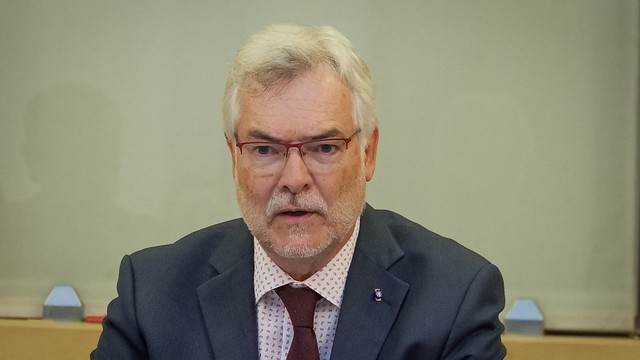Vienna, Austria—UPF-Austria participated in the general assembly that elected the board of the Austrian chapter of the Coalition of Faith-Based Organizations.
Dr. Elmar Kuhn, who serves as the president of the coalition, led the participating members of the board and guests through a comprehensive program on September 28, 2021.
To start the evening, Dr. Michael Platzer, the co-chair of CFBOs International, read words of greetings sent by Dr. Thomas Walsh, the international chair of UPF who is also the other co-chair of CFBOs International. He was followed by Dr. Stephan Leitner, deputy head of the Office of Culture in the Federal Chancellery, who expressed encouragement for this very timely initiative.
The coalition is a broad network of faith-based organizations with spiritual and moral values such as acceptance, compassion and respect for interfaith diversity. Its goal is to promote education for mutual respect, advocacy against hate speech, corruption and crime prevention, and criminal justice.
It serves as a collaborative forum that brings together faith-based organizations, believers from the world's religions, scholars, and relevant experts dedicated to these areas in states, societies, and cultures. The coalition works in partnership with a variety of UN agencies, civil society organizations, and interfaith organizations.
Its Austrian branch also sees itself as a link to Vienna-based UN agencies, such as the Office of Crime Prevention of the United Nations Office on Drugs and Crime (UNODC), and as an outreach to European organizations and faith communities.
The activities of CFBOs, which is organized as a non-profit association in Austria, focus on these four main areas:
- Law, spirituality and human rights;
- Migration, faith, and hate speech;
- Ecology and sustainability as an interreligious responsibility;
- Religious education for the respect of interreligious diversity.
In one of the keynote addresses, Gerhard Weissgrab, president of the Austrian Buddhist Religious Society, referred to the theme "Ecology and Sustainability as Interreligious Responsibility." He emphasized that—as Buddhism teaches—recognizing the interdependence of all things can be very helpful in solving problems. He said that society today could do with a constructive discourse of the middle without extremes. He concluded with the words: "We are all not only part of nature, we are nature. Buddha, too, did not awaken in a golden temple, but under a tree in the midst of nature."
The other speakers, most of whom will serve as members of the board, were:
- Bishop Heinz Lederleitner of the Old Catholic Church of Austria, speaking about “Religious Education to Respect Interreligious Diversity, Including Discrimination against Gender and Racism (as the Main Task for the Education of the Next Generation)”
- Dzemal Siblakovic, prison chaplain of the Moslems in Austria
- Allama Mudassar, director, Minhaj-ul-Quran Austria, spoke about “Law, Spirituality and Human Rights: Corruption and Environment in Islam”
- Anders Frantzen, who heads the UNODC Civil Society Team, confirmed the great interest of the UNODC in this project.
Dr. Michael Platzer spoke about cooperation with UN agencies like UNODC, and he reported about webinars and the regular meetings of the International Steering Committee.
He suggested to hold a side event at the ninth session of the Conference of the States Parties to the UN Convention against Corruption, which will take place in Sharm El-Sheikh, Egypt, from December 13 to 17, 2021, organized by UNODC.
- Ambassador Thomas Stelzer, head of the International Anti-Corruption Academy (IACA), confirmed the support of his institution.
- Emanuel Aydin, chorepiskopos of the Syrian Orthodox Church in Austria, expressed his support.
- Titus Leber, a creator of numerous large-scale interactive-cultural multimedia productions and the writer-director of the award-winning films What Did the Buddha Teach? and Borobudur—Paths to Enlightenment, offered to bring in his knowledge of African religions, which he acquired since starting the project “Africa Interactive.” The goal of this project, he said, is to preserve and disseminate Africa’s cultural heritage by smart media and interactive technology.
Peter Haider, the president of UPF-Austria and a vice president of CFBOs Austria, spoke about the annual conferences in the UN during World Interfaith Harmony Week and explained the background of this week, celebrated annually at the beginning of February since its adoption by the UN General Assembly in 2010.
The meeting concluded with finalizing the list of the board members to be able to operate in Austria and the neighboring countries of Central Europe.

